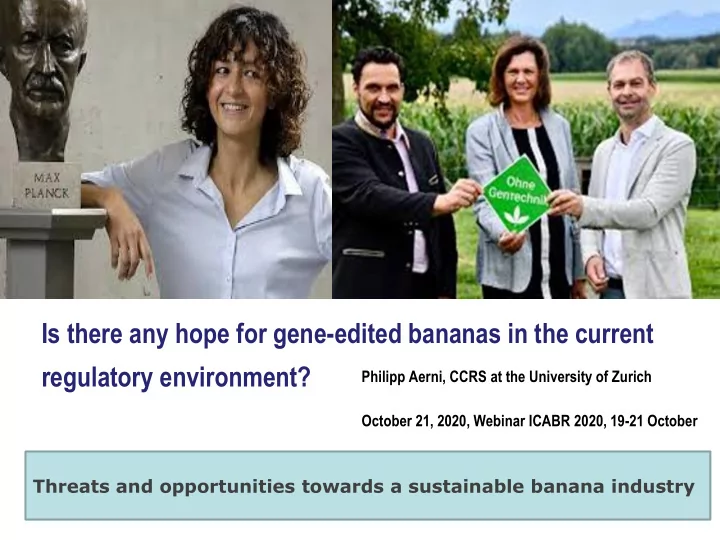

Is there any hope for gene-edited bananas in the current regulatory environment? Philipp Aerni, CCRS at the University of Zurich October 21, 2020, Webinar ICABR 2020, 19-21 October Threats and opportunities towards a sustainable banana industry Folie 1
Content 1. European GMO regulation in retrospective 2. What do consumers really want? 3. Politicizing the precautionary principle 4. The gene-editing debate 5. Is European anti-biotech policy undermining the UN SDGs? 6. Science versus Politics: The Charpentier factor 7. Concluding remarks Folie 2
1. European GMO regulation in retrospective EU Regulation: 2001/18/EC on the deliberate release of GMO into the environment Decision in favor of process-oriented regulation of GMOs. Problem with definition of a GMO: something that does not occur naturally, mutagenesis is GMO but exempt from GMO regulation WTO case in 2006 on “European Communities Measuring and Affecting the Approval and Marketing of Biotech Products” Dispute settlement panel faults the EU Union for causing undue delay (approval of the use of the Precautionary Principle as it is defined in the SPS Agreement) No retaliation measures by US/Canada/Argentina. General consensus that Europe should conduct more publicly funded risk research CH: National Research Program ( NRP59 ): CHF 12 Millionen A Decade of EU funded risk research on GMOs: EUR 200 Million Yes, there are risks, but they are known and therefore manageable Folie 3
2. What do consumers really want? Label A Natural Field Experiment funded by NFP 59 Electronic Cash Reg. compartments Sales team in „ uniform “ decoration Logo: „ corn bread: a delicacy “ Bread bags with questionnaire Folie 4
Basic insights from the field intervention study Market share of GM corn bread around 20% Freedom of choice and transparency is welcome Package size more important than bread type Attitudes toward GMOs rather weak (hardly negative reactions) Response to the study: Retailers: These consumers cannot possibly be our clients Politicians: Extending the moratorium invoking the precautionary principle (including socioeconomic / consumer concerns) Folie 5
3. Politicizing the Precautionary Principle (PP) PP is one of the most important guiding principles in environmental risk management the void in scientific understanding concerning risks of secondary effects/ complexity of cause-effect relations warrant further research EU Communication on the Precautionary Principle (2000): PP has to be based on the basic principles of risk management (Proportionality, non- discrimination and consistency in the application of measures, risk-benefit comparison, minding new findings in science) Currently, all principles are infringed in the application of the precautionary principle in Europe Excuse: Consumers would not buy GMOs in Europe Third extension of the moratorium in Switzerland in 2017, Report on the PP published by the Federal Ethics commission (EKAH 2018) gene editing = GMOs = PP = Ban Folie 6
4. The Gene-Editing Debate in the EU European Court of Justice (25.07.2018): Gene-editing is subject to process-oriented GMO regulation in line with Directive 2001/118/EC Resistance also in the mass media: UN SDGs want sustainable intensification. This does not work without biotech Uncertainty: mutagenesis likely to have more ‘off - targets’ - effects than gene-editing? P. Aerni (2019): Why disregarding facts Traceability: How to track if intervention is not known (should should not pass for we use artifical markers?) farsightedness Industrial concentration > New chance to challenge industrial concentration in agribusiness (a product of costly GMO regulation in the first place) Unresolved question: Are European retailers misleading consumers by using the ‘GMO -free ’ label? > According to 2001/18/EC mutagenesis techniques produce GMO too Folie 7
5. Is European anti-biotech policy undermining UN SDGs? Purpose of the Convention on Biological Diversity (CBD): South prepared to protect its hot spots of biodiversity in return for technology transfer and capacity development, especially in the field of biotechnology (Art. 19), to enable a more sustainable use of the resources Cartagena Protocol on Biosafety was meant to enable the safe transfer of biotechnology for the sustainable use of genetic resources: African Model Law on Biosafety in Biotechnology sponsored by Europe ensured a ban through its politicized precautionary principle approach (better safe than sorry) Demand by the European Parliament (Heubuch Report 2016): No support for the ‘ New Alliance for Food and Nutrition Security in Africa‘ if GMOs are involved Offends UN CBD, OECD Paris/Busan Declaration on Aid Effectiveness Contrary to the SDGs and Agenda 2030 Folie 8
6. Science versus Politics: The Charpentier Factor Basic lesson learned over the past three decades: Responding to emotion with reason does not work Co-Nobel Prize Winner Emanuelle Charpentier challenges popular stereotypes: A woman Europe can feel proud of! Media response in Switzerland and France : applying preventive Science matters in COVID-19 and GMO regulation to point mutation agriculture > wake-up call for Europe? with CRISPR Cas 9 is absurd! Remarkable Silence on the side of the opponents (emotional factor?) Folie 9
6. Final Remarks The Precautionary Principle , as it is applied in Europe, contradicts its spirit in many ways Exporting a flawed regulatory framework to developing countries to prevent the use of agricultural biotechnology (through pressure via access to aid and trade) is not just morally dubious but also contradicts the UN Convention on Biological Diversity European consumers do not treat labelled GMO food products any different from other novel products introduced in the food retail market > politicians remain silent about the fact Problem of framing : We would prefer the ‘ natural ’ ( thanks to retailers we confuse ‘ natural ’ with ‘ sustainable ’, and ‘ technology ’ in agriculture with ‘ unpredictable risk ’ to be banned with PP) Since the debate is about emotion and good stories, Emanuelle Charpentier may be able to re-frame the public debate in Europe Gene-editing has a great potential in effectively addressing the challenges in banana cultivation, saving the popular Cavendish banana while reducing pesticides > could be another good story Ongoing review of the ECJ decision: Europe may eventually accept the compromise that many countries already embraced (SDN-1/point mutations should not be subject to GMO regulation Folie 10
Recommend
More recommend